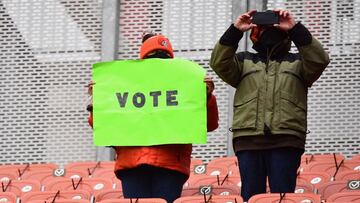How many votes do Trump and Biden need to win?
In the US the President is elected by an electoral college and not the popular vote so the candidate that reaches 270 votes is the one who wins.

It has happened five times in American history that the candidate who received the most votes in the popular count didn’t become President. When Americans go to vote it is a winner-take-all system in most states, so the candidate with the most votes gets all the electoral votes. There are two states, Maine, and Nebraska, that split their electoral votes giving two votes to the candidate who receives the majority in the state-wide vote with the remaining votes depending on the result in each congressional district.
When a president is chosen by an electoral college vote that doesn’t match the popular vote there normally have been hard feelings on the side of the losing candidate and his followers.
A history of contention
In 1824 Andrew Jackson won the popular vote with 42 percent in a four-way race but the electoral college was unable to decide which of the four candidates should be elected as they were all from the same party. In the end the House of Representatives had to decide and chose John Quincy Adams who had won less then 32 percent of the popular vote but had the Speaker of the House, who had also run for president, on his side and would later become his Secretary of State. That kerfuffle resulted in Andrew Jackson creating the Democrat Party.
The election in 1876 would become one of the most contested in American history with Samuel Tilden winning over 50 percent of the vote but he was one vote shy to be elected president in the electoral college. There were 20 electoral votes in dispute exactly the number his opponent Rutherford Hayes needed to win. In the end there was some horse trading and Hayes became President and Tilden the only candidate to lose even though he had won the majority not just a plurality of the vote.
The election of 1888 saw Grover Cleveland lose to Benjamin Harrison in an electoral college landslide even though there was just a 1 percent difference in the popular vote.
In recent times the notorious 2000 election decided essentially by the Supreme Court when it was decided that the recount of votes would be stopped in Florida, a decision that was highly controvesial and the Court even said it should not be a precedent.
Of course, the most recent was in 2016 when Donald Trump became the 45th President of the US even though he lost by two points in the popular vote he managed to win by the slimmest of margins in three key swing states.
Choose whether Trump or Biden will win each state in the 2020 presidential election and we’ll recalculate whether they have a path to 270 electoral votes and what their chance is of winning the Electoral College. https://t.co/RFiPk1ViUq pic.twitter.com/dZYfb0eT3e
— FiveThirtyEight (@FiveThirtyEight) November 1, 2020
How does the electoral college work?
The electoral college has its supporters and detractors. For those that support it is a fundamental part of American federalism promoting political stability and prevents populism from running rampant. The electoral college is stipulated in the United States Constitution, Article II, Section 1, Clause 2 which declares that every four years each state shall appoint electors in a manner its legislature determines for the sole purpose of electing the president and vice president. No person holding a federal office can be an elector.
Its detractors feel that it is less democratic and flies in the face of the notion “one person, one vote,” because rural states have more weight in the electoral college relative to their size compared to more populous states. Also, the vote ends up being determined by a handful of swing states, like Wisconsin, Pennsylvania, and Michigan in 2016.
How many electors does each state get?
Currently there are 538 electors in the electoral college and in order to become president a candidate needs at least 270 electors to win the election.
Related stories
Each state is given a number of electors based on the size of its congressional delegation in the House of Representatives and the Senate. Each state has 2 Senators and at least 1 Representative. Although Washington D.C. is not a state in 1961 it was given a number of electors as if it were but no more than the least populous state, so the city has 3 electors.
As it stands Joe Biden looks set to take the electoral college but so too did Hillary Clinton in 2016. Once again it will come down to a handful of swing states with Florida and Pennsylvania the most watched competitions this year.

